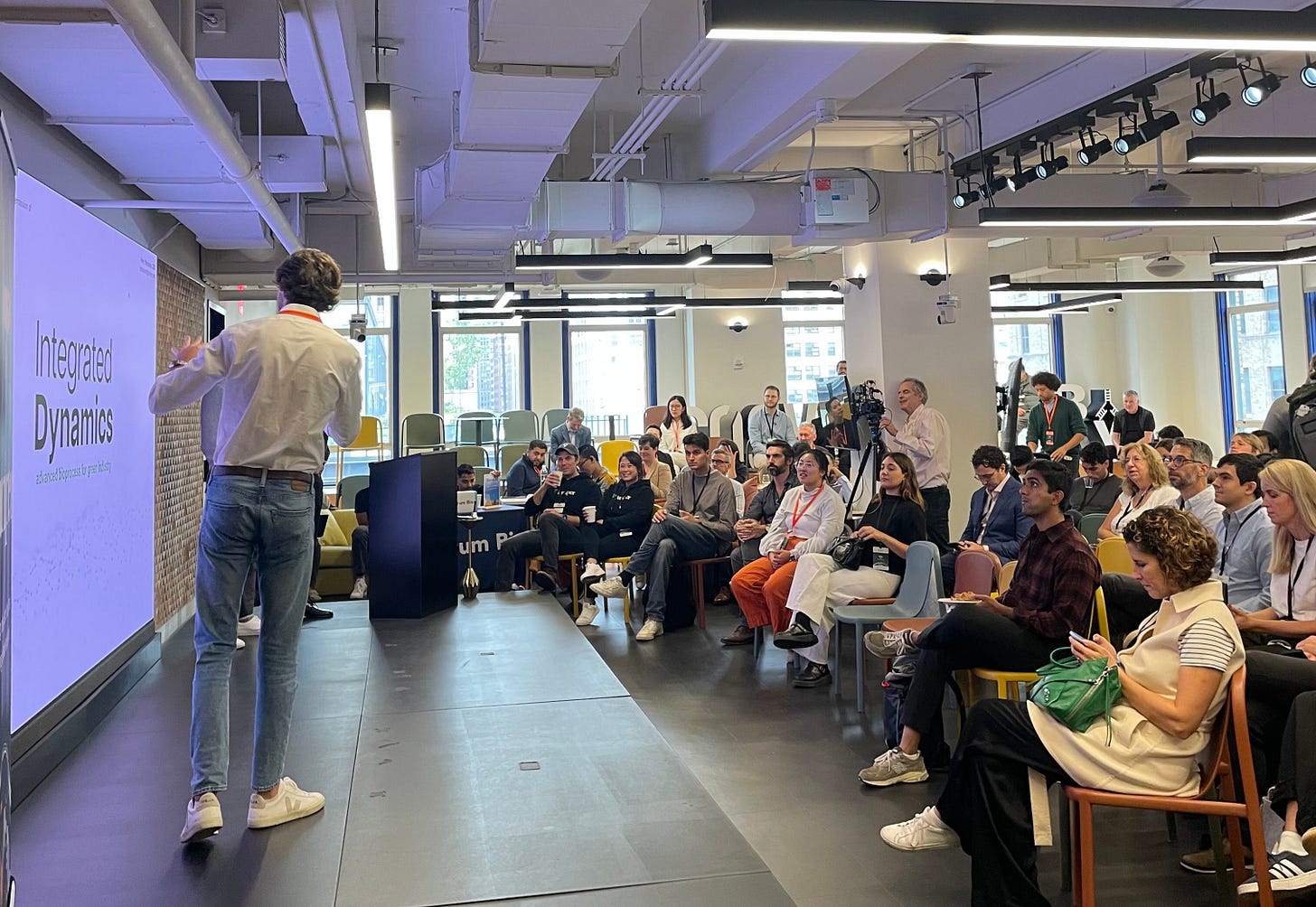We’ve returned to writing.
It’s been about 14 months of heads-down work since we last wrote one of these, so as you could assume, a lot has happened. Rather than making you dig for context through our past nine articles, I’ll re-introduce who we are and what we’re doing:
Integrated Dynamics is a Chicago-based startup that develops advanced fermentation technologies to transform organic waste into valuable hydrocarbon feedstocks. Our flagship platform-product, High-Temperature Microbial Electrolysis (HTME), uniquely leverages high-temperature synthetic microbes within a microbial electrolysis cell (MEC) for unprecedented efficiency and product selectivity. HTME decomposes organic waste up to 100x faster than standard anaerobic digestion (AD) with batch-feed retention times measured as low as 15 hours and produces hydrogen using less than 1/2 the energy as compared to standard electrolysis.
Reading the paragraph above might give you the impression that speed or efficiency is our key differentiator, but those are actually symptoms of our real moat: HTME is an antifragile solution.
Existing bioprocess is incredibly sensitive to microbial contamination; wild-type microbes are virtually omnipresent, don’t do what you want them to do, and will out-compete your target strain if given the opportunity. Operators are then forced to choose between expensive, sterile, and homogenized feedstocks (like in pharma/biochem) or use less regulated feedstocks and lose close to 80% of the system’s efficiency (most ADs are only 40-60% efficient in the first place).
Working with microbes that grow in the hyperthermophile range (>85ºC) allows us to flip this sensitivity into stability: microbes that would otherwise hurt an AD’s yields get cooked into extra bioavailable nutrients for HTME microbes. Further, systemic microbial exclusion lets us use synthetic microbes and delicate bio-electrochemical reactions without fear of off-product generation or out-competition. The HT in HTME provides the intrinsic stability upon which the ME is built.
What’s new (since August 2023)?
Tech:
We’ve optimized dark-fermentation hydrogen production with our acetate-yielding hyperthermophile strain, reaching >95% metabolic hydrogen production in less than the span of a day. This gives us the green-light to focus on electrochemistry, synthetic biology and co-culture development.
Speaking of, we’ve established the first ever hyperthermophile MEC. For IP reasons, we cannot disclose much more until our provisional patent application converts.
We’ve completed initial development of Atomic Tangerine, an Arduino-based control system for our 2L reactors. It tightly controls and records temperature-adjusted pH and allows for off-site monitoring.
Team:
We hired Corey! He earned his PhD at Northwestern and is ID’s first synthetic biologist, where he’s leading our genetic engineering efforts to broaden the capabilities of our hyperthermophiles in high-throughput bioprocess.
We also brought on Ian through the US Chamber of Commerce’s Hiring our Heroes program. Ian is transitioning out of the US Air Force and leading techno-economic analysis of our HTME implementations as we reach towards pilot scales.
We’ve built out our advisory board to include:
Michael Gibson, GP of 1517 Fund and formerly of Thiel Capital
Dr. Andrew Smith, Associate Head of UIUC Bioengineering
Dr. Elbashir Araud, Senior Research Scientist at UIUC BioNanotech Lab
Dr. Keith Tyo, Professor of Bioengineering at Northwestern
Obi Ofoegbu, VP of Engineering at Amp Americas
Commercial:
We’ve racked up six Letters of Support from national laboratories, organic waste producers, synthetic fuel companies, and more. We’re also undertaking two research demonstrations, where our public and private partners have sent us waste samples to determine their compatibility with HTME.
We’re collaborating with Lawrence Berkeley National Laboratory’s Advanced Biofuels and Bioproducts Process Development Unit (LBNL ABPDU) to analyze growth and metabolite dynamics in high-temperature fermenters. This work will reinforce our TEA and provide FOAK data on metabolic efficiency at scale.
We joined the DOD’s BioMADE consortium in September, among potential partners like LanzaTech, Cargill, and DSM.
We pitched at the inaugural cohort of Juniper Zero, hosted by Juniper VC (formerly known as Climate Capital Bio) at New York Climate Tech Week.
Cleantechies included us in a recent article.
If you’d like to learn more, please reach out at hmarkarian@int-dyn.com or over LinkedIn. Look out for news on our synthetic biology work and partnerships next edition.
-Henry, Jake, and Niranjan

